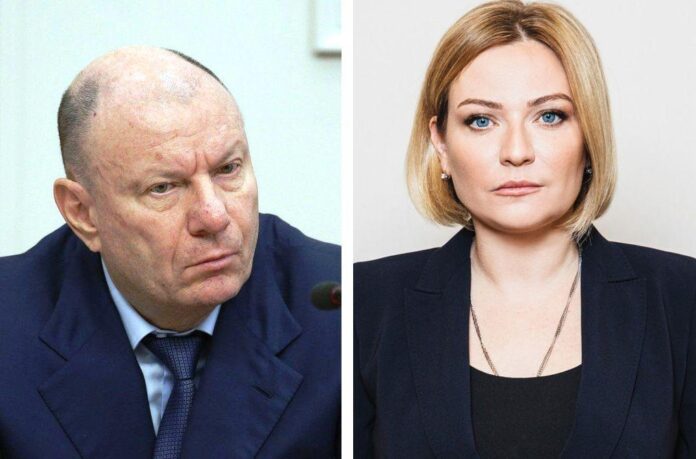Russia’s culture minister, Olga Lyubimova, has been included in the European Union’s (EU) latest list of Russian officials and individuals sanctioned due to Russia’s invasion of Ukraine. The ninth package of EU sanctions was released last week, as was the latest US list of sanctioned Russians, which includes Vladimir Potanin, a nickel tycoon who is known for his support of the arts. During the war, Ukrainian museum collections have been reportedly looted by Russia in illegally annexed territories.
“Under [Lyubimova’s] responsibility, the [Russian Culture] Ministry has extended both financial resources and programme support to the so-called ‘Donetsk People’s Republic’ and ‘Luhansk People’s Republic,’” the EU states in its official journal, published on 16 December. “Several projects undertaken under her guidance aim to integrate those illegally annexed regions of Ukraine into Russia’s cultural scene. She is also indirectly involved with the destruction of Ukraine’s cultural heritage and artefacts, and for lack of efforts to protect the cultural heritage in the now annexed territories. In taking on and acting in this capacity, she is responsible for, supporting or implementing actions or policies which undermine or threaten the territorial integrity, sovereignty and independence of Ukraine, or stability or security in Ukraine, or which obstruct the work of international organisations in Ukraine.”
Aleksandr Shkolnik, the director of Moscow’s Museum of the Great Patriotic War which glorifies the Soviet Union’s victory over Nazi Germany in the Second World War, was until now the top Russian cultural official to be targeted by sanctions. He is on a list issued by the UK and Australia last spring and has said that he is “proud” to have been included.
Inclusion on the lists bars travel to, and economic transactions in, the countries issuing the sanctions. Lyubimova has not reacted directly so far to being included. She did actively comment last week, before the list was released, on her trip to Hong Kong for the Asian Cultural Co-operation Forum (14-15 December), and meetings with cultural officials. Russian cultural exchange with Western countries has been completely cut off.
In a speech at the forum, Lyubimova said: “Russia has been and remains open to dialogue and international co-operation in all areas. We are interested in further fruitful and equal cooperation with all international partners in the interests of the development of our peoples.”
She added that Russia holds major international events, “thereby providing an opportunity for a wide audience to get acquainted with the main achievements in the field of culture of both our country and our foreign partners”.
In her Telegram channel, Lyubimova wrote about prospects for museum exchanges with China, saying that Kevin Yeung, Hong Kong’s Secretary for Culture, Sports and Tourism, “spoke highly of our institutions’ exhibitions”. After a visit to the Hong Kong Palace Museum and the M+ visual culture museum in the West Kowloon Cultural District, she wrote on 15 December: “They are interested in inter-museum dialogue with Russian institutions and are looking forward to our exhibitions. We look forward to collaborating.”
Lyubimova succeeded Vladimir Medinsky as culture minister in 2020. Medinsky, who is known for his nationalist views, was immediately appointed as a cultural adviser to Russian President Vladimir Putin. He led aborted negotiations between Russia and Ukraine immediately after the 26 February invasion. Last week was put in charge of writing a new history textbook for Russian schoolchildren that will include the war in Ukraine.
Potanin, who is the second-richest Russian businessman, worth over $26bn according to Forbes, stepped down from the board of the Guggenheim Museum in March. The Vladimir Potanin Foundation is one of the primary sponsors of museums across Russia, including the State Hermitage Museum in St. Petersburg.
Mikhail Piotrovsky, the director of the Hermitage, came out in vocal support of the war last June. His son, Boris, is vice-governor of St. Petersburg, overseeing culture, sports and media. The younger Piotrovsky has traveled to Mariupol, the city in eastern Ukraine obliterated by Russia in the early days of the invasion and boasted of its reconstruction. They have not been sanctioned.
St. Petersburg was tasked with reconstructing Mariupol when the two became sister cities in June. On Tuesday, an installation depicting intertwined hearts with the names of the two cities was returned to Palace Square in front of the Hermitage. It was partially dismantled over the weekend after a sign appeared on it saying, “Murderers, you bombed it. Judases” referring to the destruction of Mariupol. A 17-year-old high school student was detained on charges of “discrediting the armed forces of the Russian Federation” for making the sign.

























